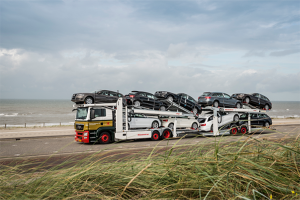28 april 2020
Pon vergroent transport met biodiesel
Pon streeft ernaar om zijn CO2-uitstoot op een zo actief mogelijke manier te verlagen. Het vergroenen van het transport, onder andere door het tanken van biodiesel (HVO), speelt hierbij een belangrijke rol.
 Pon Logistics heeft een speciale afdeling Transport. Hoofd daarvan is Henk Heijnen. ‘Vanuit mijn functie probeer ik over de verschillende bedrijven binnen Pon synergie te behalen in kwaliteit, serviceniveau en kosten’, legt hij uit. ‘Wil je vergroenen, dan moet je ook al die facetten meenemen.’
Pon Logistics heeft een speciale afdeling Transport. Hoofd daarvan is Henk Heijnen. ‘Vanuit mijn functie probeer ik over de verschillende bedrijven binnen Pon synergie te behalen in kwaliteit, serviceniveau en kosten’, legt hij uit. ‘Wil je vergroenen, dan moet je ook al die facetten meenemen.’
Transport hoort bij Pon tot de ‘Big Five’ als het gaat om CO2-uitstoot. Bovenaan staan ingehuurd transport (de opleggers die o.a. auto’s en onderdelen naar de dealers brengen) en de leaseauto’s van medewerkers. Daarna volgen afval, energie en reizen. Om te zorgen dat Pon tot een reductie van de CO2-uitstoot komt, werd Henks afdeling eind 2016 voor de uitdaging gesteld om een CO2-besparing op transport te realiseren. Samen met andere CO2-besparingen en compensatiemaatregelen draagt dat namelijk bij aan het behalen van het beoogde ‘grotere doel’: Pon CO2-neutraal.
‘We zijn gaan kijken naar de mogelijkheden en je kunt dan twee kanten op: reductie en vergroenen’, legt Henk uit. ‘Wat reductie betreft hadden we toen al veel gedaan, zoals routes optimaliseren en de beladingsgraad verhogen; daar viel dus geen grote besparing meer mee te behalen. Maar wel met vergroenen. Dat kan bijvoorbeeld door elektrificatie, alleen is er op dat gebied nog niet zo veel beschikbaar. Een andere mogelijkheid was de inzet van duurzame brandstof, zoals gas, CNG of biodiesel. We hebben gekozen voor Hydrotreated Vegetable Oil (HVO). Dat is een synthetische brandstof gemaakt uit biomassa, waarmee enorme hoeveelheden CO2 (tot bijna 90%) kunnen worden bespaard. En het mooie is dat ons eigen merk MAN trucks heeft die HVO-proof zijn.’
Pon’s transporteur Koopman leek de aangewezen partij als partner voor de realisatie. Henk: ‘Zij verzorgen meer dan de helft van onze transporten en gezien onze lange – bijna 45 jaar- en duurzame relatie waren ze bereid te investeren. Ze hebben een tankinstallatie voor HVO laten plaatsen op hun terrein in Nijkerk en een aantal voor HVO geschikte MAN-trucks aangeschaft. Die worden ingezet voor transport van zowel auto’s als onderdelen. In 2018 en 2019 hebben we daarmee een substantieel deel van het aantal liters voor Pon verbruikte brandstof kunnen vergroenen en ook dit jaar zal dat weer het geval zijn.
Een nadeel is wel dat HVO duurder is dan diesel. Duurzaamheid is nu eenmaal niet goedkoop. ‘Maar de extra kosten hebben we kunnen compenseren door het initiëren van optimalisatieprojecten’, zegt Henk enthousiast. ‘Onder andere door flexibeler met aflevertijden om te gaan, zodat je gemiddeld meer auto’s per rit hebt en dus minder ritten en kilometers maakt. Zo loont vergroenen dus.’
